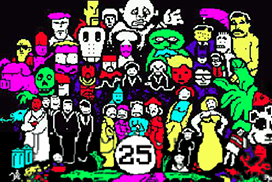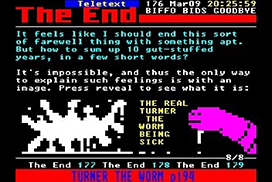
Grumble feature enabled

|
The mainstream problem
Edge #173, March 2007
Almost everyone goes to the cinema, watches TV, listens to music and reads books, but not everyone plays videogames. It's the one area of mass entertainment which refuses to drag its lurid, chattering flanks before fresh demographic groups - and by crikey does that ever frustrate the strident dons of the games industry.
To date, the rulers of Gamington have sought to garner interest from previously disinterested parties by making the sorts of games that their marketing wunderkinds tell them said parties will like. Unfortunately, said parties have remained stubbornly disinterested, preferring instead to continue inhaling their entertainment fix through a rolled-up copy of Heat magazine. However many ponies, pink fluffy things and non-violent gameplay elements they contain, games seem unable to explode onto Joe Ordinary's to-do list.
Perhaps where the industry's puppetmasters have been going wrong is that it is videogaming as a concept which girls and fogies hate; not the types of games themselves. Maybe they find something inherently off-putting about sitting down with a controller in hand, and intersecting with virtual worlds for hours on end. Maybe it's about time we accept that some spread-eagled corners of society just don't like videogames, and maybe never will.
After all, where games differ from films, books and music is that games are not like other forms of entertainment. Games are not a passive experience. For the most part you have to actually do something to play them - more than remaining sprawled in a chair, anyway.
My other half, for example, simply doesn't see the point of games. I often have to force her at knifepoint to play them. She views them akin to a painful chore, much as I baulk at the thought of filling out my VAT return, or performing dental surgery upon myself.
Making the Wii powerful enough - but no more - is an incredibly brave move on Nintendo's part, the gaming equivalent of Britain suddenly announcing the unilateral dismantling of its nuclear arsenal. There's no guarantee that its enemies won't blow it off the face of the gaming map, but there's no question that its audacious going-against-the-grain antics have got it more noticed than GameCube ever was. Indeed, for me, Christmas 2006 will forever be remembered as the Christmas where my parents went head to head on Wii bowling (and the Christmas when I ate a spoonful of ants - but that's an entirely different story).
Ultimately, the problem with targeting the mainstream is that to get the mainstream playing games you're really trying to invoke a cultural shift. It's not going to happen overnight, in the same way that introducing 24-hour licensing laws is not going to immediately change the way the British glug their booze.
Teaching your grandmother to suck virtual eggs at a family gathering - or play Guitar Hero 2, anyway - is very different to getting your grandmother to buy a Wii, and waste her retirement playing Twilight Princess.
I realised something recently, and that thing was that ordinary people - the people who don't read Edge - are sort of put off by what magazines and games fans define as 'good graphics'. What we view as the big games would be dwarfed by the sales of the biggest music CDs. I appreciate that Gears Of War has sold a couple of million copies, but if it were the biggest album of the year it should be selling a couple of hundred million copies.
There's a massive subculture of music too complex and layered to appeal to the majority, and I fear that, in a weird way, most - if not all - games fall into this category. Games, as a whole, are too complex for the majority of people. Or, at least, they look too complex.
If I were to show my sisters or parents - none of whom you'd describe as gamers - Gears Of War they'd shrug their shoulders. Yet expose them to Wii Sports, and they're snared. Waggle a DS and Tetris under their gaping noses, and they'll probably give it a go. Show them Vice City Stories and they'll go back to flicking crumbs out of their stretch marks.
I don't think Sony and Microsoft are misguided in chasing the graphics dragon - because there are those of us out there who are graphics tarts (and with the current pricing policies it's clearly enough of us to be profitable) - but they're never going to lure a mainstream audience when they're using the likes of Resistance: Fall Of Man and Gears Of War to showcase their consoles.
In all honesty, I genuinely believe that Microsoft is better off using Geometry Wars: Retro Evolved, or Gauntlet, to sell its machine. At the same time, I'm not convinced that doing so would be enough to make the shift. The Wii may make in-roads to the mainstream, but I think we're still a couple of generations away from the day when everyone plays games.
By which point we'll all be paddling around in three metres of melted polar ice, but that's beside the point.
Mr Biffo co-founded Digitiser, Channel 4's Teletext-based videogames section, and now writes mainly for television
Do you know of any important moments from the annals of Digi history that have been omitted? If so, then mail me (superpage58@gmail.com) right now, man. Credit will be duly given for anything that gets put up.









